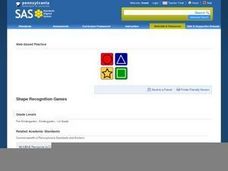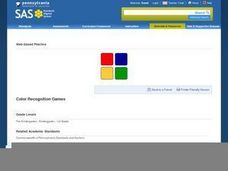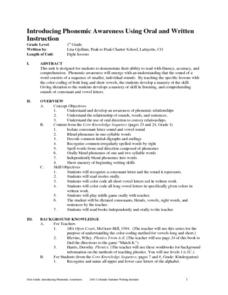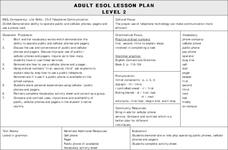Meadows Center for Preventing Educational Risk, University of Texas at Austin
Lesson 4 - Consonant Blends
Old, ild, ind, and ost may sound like a foreign language, but they actually represent common final consonant blends. Help learners recognize and pronounce consonant blends with step-by-step instructions, including scripted conversations....
Curated OER
Blast-Off to Blending
Practice working with different phonemes in consonants and vowels. Sounds are written on squares that get put on a rocket to "blast off" and meet other sounds. The teacher first models blending, then reads the new words. Young readers...
Curated OER
Igga Bigga
Students explore consonant digraphs in written words and use them in their own sentences. They work with /th/, /sh/, and /ch/ digraphs. Students read The Little Old Lady Who Was Not Afraid of Anything and identify words with the...
Curated OER
Beginning and Ending Sounds
First graders practice the beginning and ending sounds of words. In this phonological awareness lesson, 1st graders use picture cards for one syllable words and pronounce each word. Students match other picture cards with the same...
Curated OER
Beginning and Ending Sounds
First graders practice their letter and word recognition skills. In this initial and final sounds lesson, 1st graders participate in a classroom activity that requires them to blend phonemes into spoken words and sound out multisyllable...
Curated OER
Shaggy Sheba Shakes!
Young scholars study the /sh/ digraph in order to determine that when the letters are together in a word they make one sound. They use letter boxes, letter manipulatives with the sh taped together, and poem, "My Shaggy Dog." Using the...
Curated OER
I'm going to chase you
First graders identify the digraphs in written and spoken language. After a brief discussion of the combinations of /c/ and /h/ that comprise the /ch/ digraph, 1st graders practice identifying initial and final placement of the digraph...
Curated OER
Sh Sh Sh: The Baby is Sleeping
Students work with the /sh/ digraph. They read and spell words that contain the phoneme /sh/. Students read Sh!Sh! Stop that Noise. They identify the words containing the phoneme /sh/ while reading the story. Students practice spelling...
Curated OER
Choo Choo Train
Students identify the digraphs in written and spoken language. After a brief discussion of the combinations of /c/ and /h/ that comprise th /ch/ digraph, students practice identifying initial and final placement of the digraph /ch/ in...
Curated OER
Diphthongs
Second graders examine and identify the diphthongs /oi/ and /oy/. They discuss the two ways that this sound is spelled and read words containing this vowel combination, create a list of words with /oi/ and /oy/, and complete a worksheet.
Curated OER
Double Jeopardy-Homophones
Second graders identify homophones as words that sound alike but have different meanings. They, given a pair of homophones, are to explain the meanings of the words using gestures, role playing, or drawing a picture with their partner.
Curated OER
Word Washer Vowels
Here is a perfect activity for all your kinesthetic learners. They practice long and short vowel discrimination as they hang out the paper articles of clothing on a clothes line. They each take turns pulling word clothes out of a pretend...
Curated OER
Guided Reading with Ten Oni Drummers
Second graders read the book, Ten Oni Drummers. Working in guided reading groups, they discuss fantasy as a genre and preview the book. They review word identification strategies and read the book silently. After reading, they confirm...
Curated OER
Number Recognition Games
Students explore number sense by participating in a math recognition activity. In this number identification lesson, students practice pronouncing names of numbers and matching the number with an amount of objects. Students practice...
Curated OER
Shape Recognition Games
Young scholars explore shapes. In this math lesson, students identify basic geometric shapes. Young scholars complete activities in which they identify shapes, symbols and letters. Students draw geometric shapes.
Curated OER
Guided Reading with Two Sweet Peas
Second graders read the book, Two Sweet Peas. Working in guided reading groups, they discuss moving, making friends, and the differences between poems and stories. They read the book silently and discuss the importance of being kind and...
Curated OER
Picture Match
Young scholars match pictures with words that have specific phonics connotations. For this picture matching lesson plan, students have groups of words with the same phonics sayings.
Pennsylvania Department of Education
Writing With Environmental Print
Students develop literacy skills by exploring street signs, cereal boxes, and billboards. In this writing with environmental print lesson, students build word recognition in every day print. Students decode words and discover new words.
Curated OER
Letter Recognition Flash Games for Kids
Students explore the alphabet by completing an on-line letter identification activity. In this phonetics lesson, students utilize the website www.literarycenter.net and listen to word sounds as they identify the spelling of the...
Curated OER
Color Recognition Game
Students study color words. For this math lesson, students complete a variety of activities on the computer in which they identify colors and color words.
Curated OER
Spinning Short Vowel Game
First graders, in pairs, use spinners to experiment with different combinations of letters. They combine letters and determine whether they have produced a word or not. They construct and record words choosing letters from designated tiles.
Curated OER
ADULT ESOL LESSON PLAN--Literacy/Foundations--LCP A
Students, after reviewing a variety of vocabulary terms, examine how interpersonal communication effects cultures everywhere. They analyze how to respond and give polite expressions to others in conversations.
Curated OER
Introducing Phonemic Awareness Using Oral and Written Instruction
First graders demonstrate their ability to read with fluency, accuracy, and comprehension through phonemic awareness. They use a color-coding system to master the long and short vowel sounds and develop their skills in listening and...
Curated OER
ESOL Telephone Communication
Students discuss the use and convenience of public and cellular phones and how to use them. They compare and contrast uses, importance and availability of public, cellular phones and pagers in the student's native country.

























